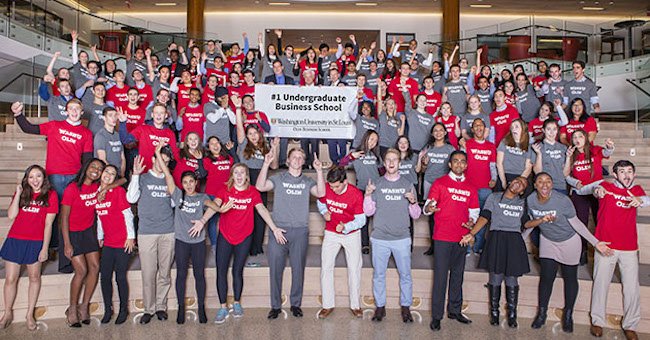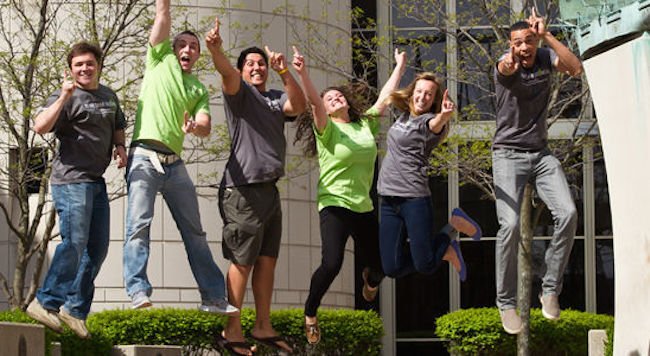
Washington University’s Olin School of Business has the best undergraduate business program in the U.S.
Call it the rise of the Nice Guy. Sometimes, he just refuses to finish last. And in the case of the first-ever Poets&Quants ranking of undergraduate business programs, the nice guys (and gals), indeed have their day. No other school provides a better undergraduate business education than the Olin Business School at Washington University in St. Louis.
The first thing their freshly minted dean wants everyone to know is they are Midwestern and they are nice. “The Midwest is really a wonderful place to be. It is true about people being kind and caring here and I think that is a big part of business education,” says Dean Mark Taylor, who just arrived as dean from Britain’s Warwick Business School. “We are an elite school, but we are not an elitist school.”
In an inaugural ranking that equally weighed admission standards, the quality of the academic experience judged by recent alumni, and employment outcomes, Olin emerged the undisputed winner. The school is in great company. Rounding out the top five are Notre Dame University’s Mendoza School of Business, the University of Pennsylvania’s Wharton School, Georgetown University’s McDonough School of Business, and the University of California-Berkeley’s Haas School of Business.
A GROUP OF BUSINESS SCHOOLS THAT ARE IN THE TOP SEVENTH PERCENTILE
In all, Poets&Quants ranked 50 extraordinary schools, a select group of institutions that make up the top seventh percentile of all accredited undergraduate business experiences. The list includes publics and privates, two- and four-year business programs, schools with highly demanding academics and those that even teach business etiquette. Some of these undergraduate programs boast admissions standards that are tougher than Harvard Business School, which does not have an undergraduate program. Some can lay claim to having world class teaching faculties, completely dedicated to their students in every way. All are producing well-rounded and highly sought-after graduates by the world’s most admired employers.
“With top faculty, top experiential learning, and top students, it doesn’t surprise me that we are achieving in this fashion,” says Taylor, who succeeded the long-serving dean of the school, Mahendra Gupta, and was interviewed by Poets&Quants on his first official day as dean. “We have an extremely high quality intake of students and then we add value to that.”
Ask the second-place finisher what sets its school and students apart, and it’s more of the same. “Mendoza really stands behind that ethical tie of being a force for good in the world,” says Hilary Flanagan, the director of the Career Center at the University of Notre Dame. “For us, it’s not just a tagline. The students are really drawn to that message and that greater purpose beyond what they know is going to be an academically rigorous four years.”
A NEW & HIGHLY CREDIBLE EVALUATION OF UNDERGRADUATE B-SCHOOLS
Both Olin and Mendoza exemplify exactly what Poets&Quants set out to measure while building this newest evaluation of undergraduate business programs. They enroll driven, smart, hardworking students. They give them approachable faculty, innovative learning approaches, engaging extracurricular activities, and signature academic experiences. And they get those students employed, often at employment rates and salaries that are mind-boggling. For this year, they do it better than any other schools in the country.
This new ranking is certainly not the first to rate the quality of undergraduate business schools. But it is the most thorough, credible and authoritative effort to date. Currently, U.S. News and World Report ranks undergrad programs based solely on an opinion survey of deans and senior faculty, which largely amounts to a popularity contest rather than a true test of a school’s quality. The latest and last assessment of undergraduate programs by Bloomberg Businessweek was heavily weighted on outcomes, with no evaluation of the quality of incoming students and little weight given to the academic experience.
Our approach to ranking the best, developed in collaboration with business school deans and administrators, puts equal emphasis on admissions standards, the total student experience, and job and starting pay outcomes (see How We Crunched The Numbers). Not every school cooperated with our effort. In cases where institutions declined to participate, publicly available statistics and estimates based on that data and peer group comparisons were used to rank programs. All of the stats were given to participating and non-participating schools in advance of publication to ensure their accuracy.
THREE DIFFERENT SCHOOLS WERE ON TOP OF EACH OF THREE CORE METRICS
The result of this year-long effort is a report on undergraduate business education that is second to none. Our admissions standards measured average SAT scores, acceptance rates and the percentage of incoming students who were in the top 10% of their high school classes. Our employment outcomes weighed the percentage of students with internships prior to senior year, the percentage with jobs three months after graduation, and the average salary and bonus of a graduate. Instead of asking alumni about facilities, computer labs, libraries, and books, we asked the real bottom line questions. Was their degree worth its cost in time and tuition? Did the school’s extracurricular offerings nurture their growth as people and business experts? Were faculty available for mentoring and meetings outside of class? Were alumni approachable and helpful? (See Rankings Report Card: How Alums Grade Their Schools).
Not surprisingly, the schools at the top of our list did well in all three categories of evaluation. Yet, there were notable differences as well. In taking first place, for example, Washington University’s Olin School did not win outright any of the three core ranking metrics. The school finished third in both admissions standards and academic experience and is 11th in employment outcomes. Still, its overall weighted average was enough to propel the school to the top, confirming the excellence Olin hits on all three areas of evaluation. “It’s interesting that you have these three components and we didn’t end up at the top of any one of them,” Taylor concurs, “although when you take the weighted average, we become first. I think that shows real balance across the school.”
Similarly, Georgetown McDonough placed fourth by scoring exceptionally high — but not first — across our ranking criteria, finishing sixth in admissions, seventh in academic experience, and fourth in job and pay outcomes. All three other schools in the top five won a category: UC-Berkeley in admissions, Notre Dame in the overall student and academic experience, and Wharton in employment outcomes.











